牛津高中英语 牛津版 译林版 高一 模块一 Unit2 sUnit 2 Growing Pains 教案
- 格式:doc
- 大小:32.50 KB
- 文档页数:2
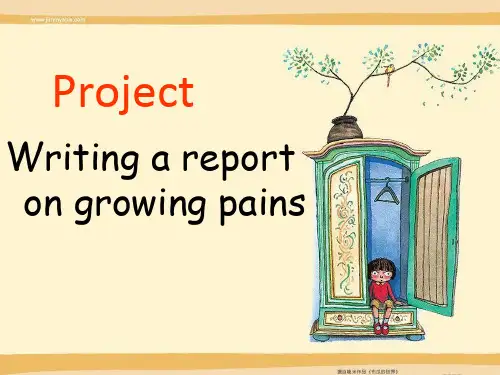
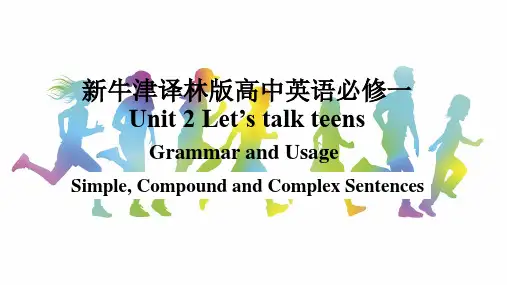
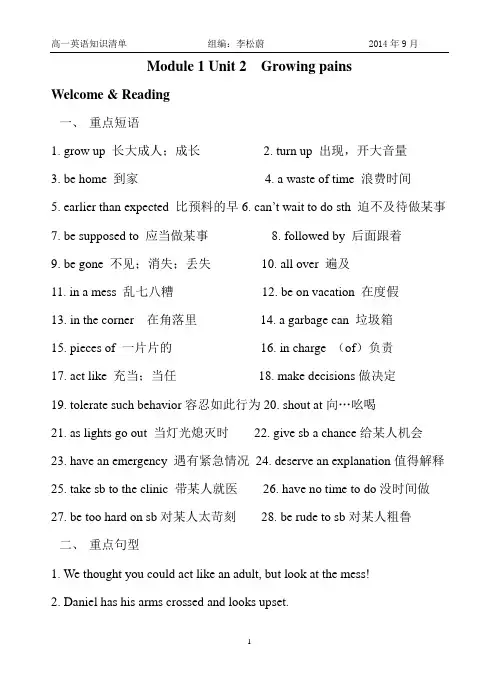
Module 1 Unit 2 Growing painsWelcome & Reading一、重点短语1. grow up 长大成人;成长2. turn up 出现,开大音量3. be home 到家4. a waste of time 浪费时间5. earlier than expected 比预料的早6. can’t wait to do sth 迫不及待做某事7. be supposed to 应当做某事8. followed by 后面跟着9. be gone 不见;消失;丢失10. all over 遍及11. in a mess 乱七八糟12. be on vacation 在度假13. in the corner 在角落里14. a garbage can 垃圾箱15. pieces of 一片片的16. in charge (of)负责17. act like 充当;当任18. make decisions做决定19. tolerate such behavior容忍如此行为20. shout at向…吆喝21. as lights go out 当灯光熄灭时22. give sb a chance给某人机会23. have an emergency 遇有紧急情况24. deserve an explanation值得解释25. take sb to the clinic 带某人就医26. have no time to do没时间做27. be too hard on sb对某人太苛刻28. be rude to sb对某人粗鲁二、重点句型1. We thought you could act like an adult, but look at the mess!2. Daniel has his arms crossed and looks upset.3. The money for dog food is gone, but Spot looks like he is starving.4. Maybe, but now that he has been so rude to us, I feel like we have to punish him or he won’t respect us.5. We won’t tolerate such behavior in our house.6. There is probably a good explanation for everything, but you are not supposed to act that way.7. Daniel has his arms crossed and looks upset.8.Anyhow, next time we were on vacation, if you have an emergency like this you should call us.Word power, grammar & task一、重点短语1. differ in many ways 在很多方面不同2. shopping centre购物中心3. a piece of cake 小菜一碟4. a wet blanket扫兴的人或物5. make friends with与某人交朋友6. in the past在过去7. go to the cinema去看电影8. go to sleep入睡9. make sb upset使某人不安10. a little bit expensive稍微有点贵11.be nervous about对…感到紧张12. make an error出差错13. insist on doing坚持做某事14. get along with相处;进展15. get annoyed 生气的16. all ears 全神贯注地听17. pull one’s leg开玩笑18.have green fingers 绿手指;园艺能手19. the top dog 胜利者;主要人物20. give sb the cold shoulder冷眼相待21. rain cats and dogs下倾盆大雨22one’s cap of tea某人钟爱之物二、重点句型1. However , I am worried that if I keep allowing him to do what he want he wants, he may fail at school, or worse.2. The way (that/ in which) he teaches English is interesting.3. Dad is a person whom /that /who I can easily talk to.4. The study is the place where/ in which I often have talks with my father.5. He even forbids me from chatting with my friends in the Internet café! Project一、重点短语1. feel lonely感觉寂寞2. in other ways在别的方面3. out of control失去控制4. go through经历;经受5. become confused with对…感到困惑6. psychological changes心理变化7. in this regard在这一方面8. part of the group群体的一部分9. fit in society适应社会10. be traded for与…交易二、重点句型1.. This feelings are a common part of adolescence——the time of lifebetween child and adult.2. These feelings can be thought of as growing pains——the difficulties thatteenagers face as they grow to adults.3. At the same time, girls often want someone——anyone——to talk to,, asthey try to deel with their strong feelings.4. In the social world, as teenagers get older, they struggle to depend on themselves.5. The good news is that these kinds of growing pains do not last.。
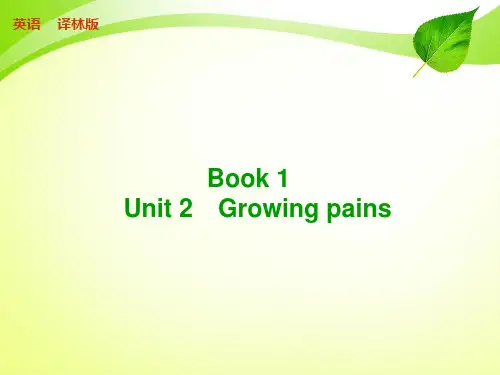
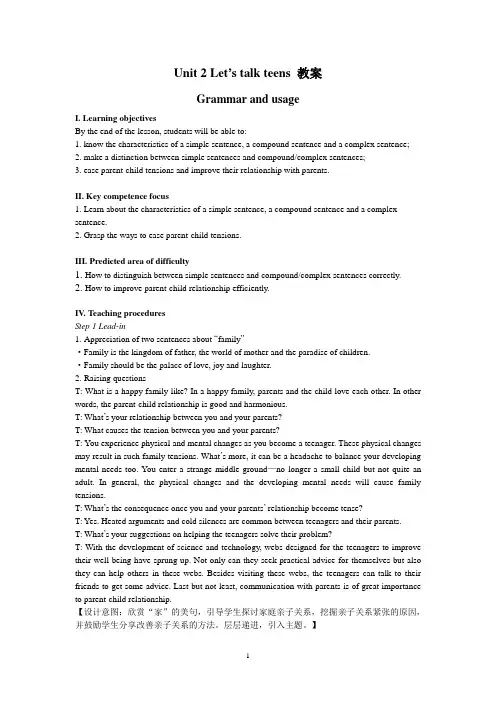
Unit 2 Let’s talk teens 教案Grammar and usageI. Learning objectivesBy the end of the lesson, students will be able to:1. know the characteristics of a simple sentence, a compound sentence and a complex sentence;2. make a distinction between simple sentences and compound/complex sentences;3. ease parent-child tensions and improve their relationship with parents.II. Key competence focus1. Learn about the characteristics of a simple sentence, a compound sentence and a complex sentence.2. Grasp the ways to ease parent-child tensions.III. Predicted area of difficulty1. How to distinguish between simple sentences and compound/complex sentences correctly.2. How to improve parent-child relationship efficiently.IV. Teaching proceduresStep 1 Lead-in1.Appreciation of two sentences about “family”·Family is the kingdom of father, the world of mother and the paradise of children.·Family should be the palace of love, joy and laughter.2.Raising questionsT: What is a happy family like? In a happy family, parents and the child love each other. In other words, the parent-child relationship is good and harmonious.T: What’s your relationship between you and your parents?T: What causes the tension between you and your parents?T: You experience physical and mental changes as you become a teenager. These physical changes may result in such family tensions. What’s more, it can be a headache to balance your developing mental needs too. You enter a strange middle ground—no longer a small child but not quite an adult. In general, the physical changes and the developing mental needs will cause family tensions.T: What’s the consequence once you and your parents’ relationship become tense?T: Yes. Heated arguments and cold silences are common between teenagers and their parents.T: What’s your suggestions on helping the teenagers solve their problem?T: With the development of science and technology, webs designed for the teenagers to improve their well-being have sprung up. Not only can they seek practical advice for themselves but also they can help others in these webs. Besides visiting these webs, the teenagers can talk to their friends to get some advice. Last but not least, communication with parents is of great importance to parent-child relationship.【设计意图:欣赏“家”的美句,引导学生探讨家庭亲子关系,挖掘亲子关系紧张的原因,并鼓励学生分享改善亲子关系的方法。
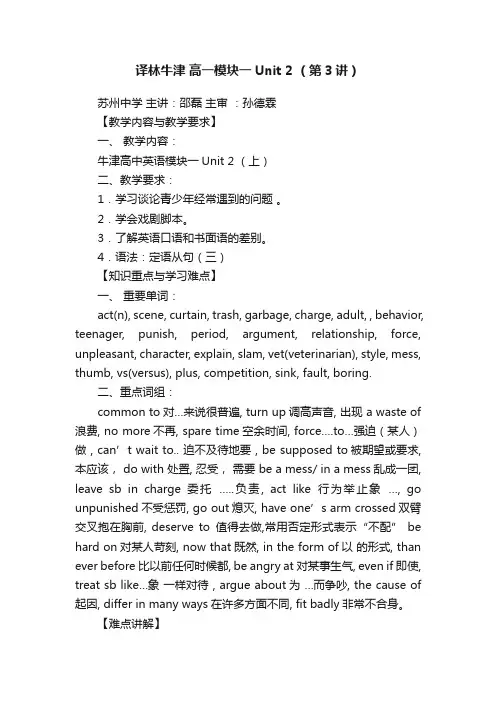
译林牛津高一模块一Unit 2 (第3讲)苏州中学主讲:邵磊主审:孙德霖【教学内容与教学要求】一、教学内容:牛津高中英语模块一Unit 2 (上)二、教学要求:1.学习谈论青少年经常遇到的问题。
2.学会戏剧脚本。
3.了解英语口语和书面语的差别。
4.语法:定语从句(三)【知识重点与学习难点】一、重要单词:act(n), scene, curtain, trash, garbage, charge, adult, , behavior, teenager, punish, period, argument, relationship, force, unpleasant, character, explain, slam, vet(veterinarian), style, mess, thumb, vs(versus), plus, competition, sink, fault, boring.二、重点词组:common to对…来说很普遍, turn up调高声音, 出现 a waste of 浪费, no more不再, spare time空余时间, force….to…强迫(某人)做, can’t wait to.. 迫不及待地要 , be supposed to被期望或要求, 本应该, do with 处置, 忍受,需要 be a mess/ in a mess乱成一团, leave sb in charge 委托…..负责, act like行为举止象…, go unpunished不受惩罚, go out熄灭, have one’s arm crossed双臂交叉抱在胸前, deserve to值得去做,常用否定形式表示“不配” be hard on对某人苛刻, now that既然, in the form of以的形式, than ever before比以前任何时候都, be angry at对某事生气, even if即使, treat sb like…象一样对待 , argue about为…而争吵, the cause of 起因, differ in many ways在许多方面不同, fit badly非常不合身。
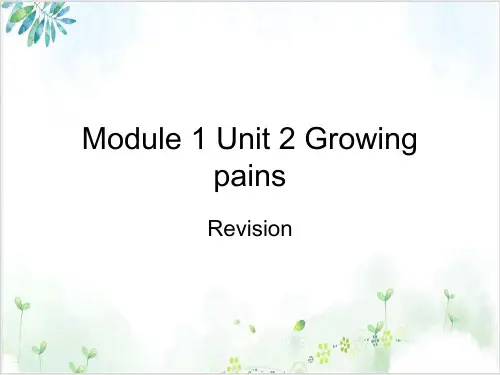

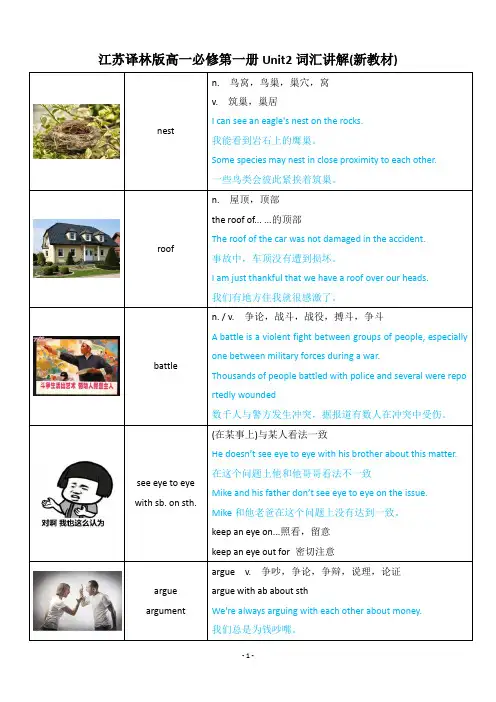
江苏译林版高一必修第一册Unit2词汇讲解(新教材)nest n. 鸟窝,鸟巢,巢穴,窝v. 筑巢,巢居I can see an eagle's nest on the rocks.我能看到岩石上的鹰巢。
Some species may nest in close proximity to each other. 一些鸟类会彼此紧挨着筑巢。
roof n. 屋顶,顶部the roof of... ...的顶部The roof of the car was not damaged in the accident. 事故中,车顶没有遭到损坏。
I am just thankful that we have a roof over our heads. 我们有地方住我就很感激了。
battle n. / v. 争论,战斗,战役,搏斗,争斗A battle is a violent fight between groups of people, especially one between military forces during a war.Thousands of people battled with police and several were repo rtedly wounded数千人与警方发生冲突,据报道有数人在冲突中受伤。
see eye to eye with sb. on sth. (在某事上)与某人看法一致He doesn’t see eye to eye with his brother about this matter. 在这个问题上他和他哥哥看法不一致Mike and his father don’t see eye to e ye on the issue.Mike和他老爸在这个问题上没有达到一致。
keep an eye on...照看,留意keep an eye out for 密切注意argue argument argue v. 争吵,争论,争辩,说理,论证argue with ab about sthWe're always arguing with each other about money. 我们总是为钱吵嘴。
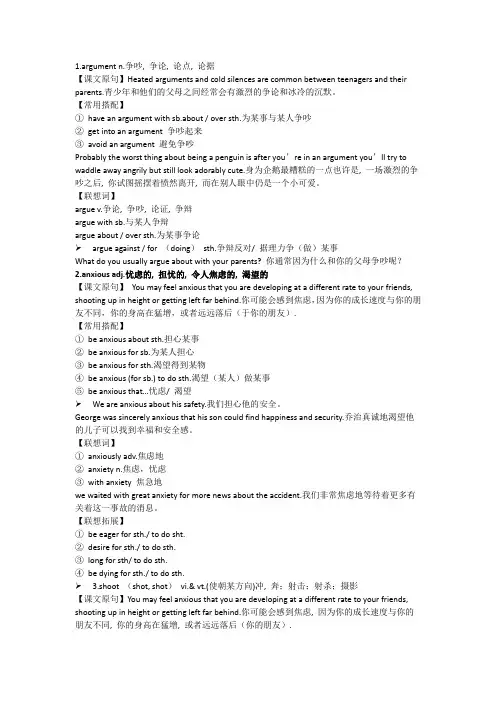
1.argument n.争吵, 争论, 论点, 论据【课文原句】Heated arguments and cold silences are common between teenagers and their parents.青少年和他们的父母之间经常会有激烈的争论和冰冷的沉默。
【常用搭配】①have an argument with sb.about / over sth.为某事与某人争吵②get into an argument 争吵起来③avoid an argument 避免争吵Probably the worst thing about being a penguin is after you’re in an argument you’ll try to waddle away angrily but still look adorably cute.身为企鹅最糟糕的一点也许是, 一场激烈的争吵之后, 你试图摇摆着愤然离开, 而在别人眼中仍是一个小可爱。
【联想词】argue v.争论, 争吵, 论证, 争辩argue with sb.与某人争辩argue about / over sth.为某事争论➢argue against / for (doing)sth.争辩反对/ 据理力争(做)某事What do you usually argue about with your parents? 你通常因为什么和你的父母争吵呢?2.anxious adj.忧虑的, 担忧的, 令人焦虑的, 渴望的【课文原句】You may feel anxious that you are developing at a different rate to your friends, shooting up in height or getting left far behind.你可能会感到焦虑,因为你的成长速度与你的朋友不同,你的身高在猛增,或者远远落后(于你的朋友).【常用搭配】①be anxious about sth.担心某事②be anxious for sb.为某人担心③be anxious for sth.渴望得到某物④be anxious (for sb.) to do sth.渴望(某人)做某事⑤be anxious that…忧虑/ 渴望➢We are anxious about his safety.我们担心他的安全。

高中译林牛津英语模块一U n i t2教案-CAL-FENGHAI-(2020YEAR-YICAI)_JINGBIANModule1 Unit1教学设计课时主备教案课型 Welcome + WordpowerLearning objectives:By the end of this period, students will be able to1. enlarge their own knowledge by knowing the differences between American English and British English in pronunciation, grammar, vocabulary and spelling;2. improve their spoken skills by describing their own experiences or speaking about what they have heard or seen in the past tense;3. be aware of the sense of language by learning some English colloquialisms. Focus of the lesson:1. relations between parents and teenagers2. differences between American English and British English3. different colloquialismsPredicted area of difficulties:1. how to improve the relationships between parents and teenagers if they are not so good;2. how to use colloquialisms properly.Learning aids:1. PPT2. blackboard课型 Reading(I)Learning objectives:By the end of this period, students will be able to1. know more information about American family life;2. learn the basic skills of how to read a play and act out the play with the help of a teacher;3. form a positive attitude towards growing pains.Focus of the lesson:1. characteristics of a play;2. a performance of a play;Predicted area of difficulties:How to act in the playLearning methods:1. PPT2. blackboard课型 Reading(II)Learning objectives:By the end of this period, students will be able to1. write out the transformation of the key words and phrases correctly;2. use the key words properly in relevant tasks;3. know some words and phrases in a play;4. raise the awareness of learning new words or phrases in a context. Focus of the lesson:1. usage of the key words and expressions;2. verb tenses in a play and some stage instructions.Predicted area of difficulties:1. the usage of the following words and phrases ‘follow’ ‘be supposed to do’ ‘tolerate ‘deserve’ and so on;2. the proper usage of relative adverbs.Learning aids:1. PPT2. blackboardLearning procedures:课型 Grammar & UsageLearning objectives:By the end of this period, students will be able to1. better understand the grammatical functions of attributive clauses;2. use prepositions +which / whom3. use relative adverb s ‘when’ ‘wh ere’ ‘wh y’ ;4. enjoy the neatness & beauty of attributive clauses comparing them with simple sentences.Focus of the lesson:1. the usage of relative adverbs;2. the exchange of “prepositions +which” and relative adverbs.Predicted area of difficulties:1. the usage of relative adverbs;2. how to distinguish relative pronouns and relative adverbs.Learning aids:1. PPT2. blackboardLearning procedures:课型 TaskLearning objectives:At the end of this lesson, students will be able to:1. understand the main points and the mood of the writer by reading four diary entries.2. know how to write a letter for advice and a letter of reply.3. know a better way to solve the problem between teenagers and parents. Focus of the lesson:Reading for key points and main idea.Predicted learning difficulties:How to get the key points in a diaryLearning aids:1. PPT2. blackboardLearning procedures:课型 ProjectLearning objectives:By the end of this period, students will be able to:1. know what are growing pains;2. identify the three types of changes of growing pains;3. learn to deal with the changes properly and develop healthily both physically and mentally.Focus of the lesson:1. three kinds of changes;2. proper ways to deal with them;Learning aids:1. PPT2. blackboardLearning procedures:。
Unit2 (M1)1.act(n.)(戏剧的)一幕(v.)行动actor actressaction(n.)行动Actions speak louder than words.2.curtain(n.)窗帘;(舞台上的)幕布draw the curtains=close the curtains3.can’t wait to do sth.迫不及待地做某事I couldn’t wait to open the present.我迫不及待地要打开礼物。
4.soccer(n.)英式足球,足球踢足球play soccer5.frightened(adj.)害怕的afraidfrighten(v.)(使)惊恐,恐慌;吓走He fired into the air, hoping that the noise would frighten them away.他向空中开枪,希望枪声能把它们吓走。
He was a bully. He tried to frighten people into doing what he wanted.他恃强欺弱,总是想吓得人们按他的意愿做事。
frightening(adj.)吓人的It's really a frightening experience.这真是一场令人恐惧的经历。
6.be supposed to do 应该------We are supposed to do this exercise for homework .7.bend(v.)弯腰,屈身;(使)弯曲bend--ben t--ben t8.starve(v.)(使)挨饿;饿死It might not be your dream job, but you're not going to starve.也许那不是你梦寐以求的工作,但至少你不会饿死。
starve to death饿死He would rather starve to death than shamelessly beg for his life.他宁愿饿死也不无耻求饶。
Teaching plan for Unit 2 “Growing Pains”
Period 1 Welcome to this unit
Teaching objectives:
◆To introduce and develop the theme of growing pains.
◆To develop speaking ability by talking about families and problems that happen between
teenagers and parents.
◆To know more about classmates and their families.
Important and difficult points:
◆Get students to understand what growing pains means.
◆Make students know the relationship between parents and their teenage children in the USA.
◆Help students to form a positive attitude towards relationships between their parents and
them.
Teaching procedures:
Step 1 lead-in
Present family albums:
In this part, Ss are encouraged to say something about their families by showing the class pictures with their parents.
Who may have growing pains?
What are Growing pains?
When do they probably have growing pains?
How do you solve this problem?
Growing pains aren't a disease. You probably won't have to go to the doctor for them. But they can hurt. Usually they happen when kids are between the ages of 3 and 5 or 8 and 12. Growing pains stop when kids stop growing. By the teen years, most kids don't get growing pains anymore. Growing pains also mean the troubles and difficulties that teenagers meet when they grow up. Step 2 Brainstorming
Do you love your parents?
Do you always show respect to your parents?
Have you ever quarreled with your parents?
What is your quarrel about?
Step 3 Picture discussion
Ask Ss to look at the pictures and discuss each picture in groups of four.
Picture 1
What does the boy do?
What is the mother doing? How is she probably feeling?
What feelings may the boy have?
Picture 2
What happens to the girl with a bag?
What did her parents ask her to do?
Can you guess what might have happened to her?
What will she do?
Picture 3
Why are the boys and girls around the pretty lady?
What does the boy want to do? Is he allowed to do so? Why or why not?
What feelings may the boy have?
Picture 4
What is the boy probably doing?
Did the boy do well in his exams?
How does his mother feel about the score?
What feelings may the boy have?
Step 4 Picture discription
Imagine the situations and try to describe each picture as fully as possible with their own words. Make sure that Ss have “when”, “where”, “who”, “what” in your descriptions.
Invite some Ss to report back their descriptions.
Sharing opinions (group work)
In this part, Ss discuss the following questions in groups of four. Each group chooses two of the four questions. Have Ss to report their opinions in class.
Step 4 Further Discussion
Discuss the following questions in groups of four.
What do you do when you have family arguments with your parents?
Do you think there is a generation gap between you and your parents? If so, what is the best way to solve the problem?
Homework
1 Preview the Reading part.
2 Describe an unpleasant experience with your friends/teachers.。